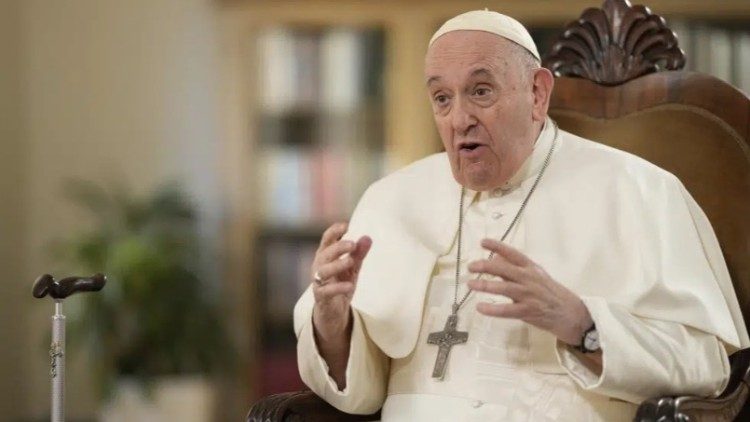José Maria C.S. André
Two days ago, Pope Francis gave an interview to the Associated Press (AP) news agency, which has been, since almost 200 years, the largest and most influential news agency in the world. Its headquarters is in the United States and AP has hundreds of offices in 99 countries around the world. Largely, AP has been very aggressive against the Catholic Church but a giant of this size has room for many exceptions, as this interview showed.
The conversation with the journalists ventured across many important topics.
Obviously, they talked about Benedict XVI, whom Francis described as a father and a gentleman, very generous, very open, on whom he leaned a lot: “when I had doubts, I would call the driver and go to the monastery to ask him.”
The journalists mentioned the criticisms. Francis replied that he prefers face-to-face rather than anonymous criticisms: “openly, because that’s how we all grow.”
“Some of them came to me and we discussed. Normally, as mature people do, we talk. I didn’t fight with anyone, but I gave my opinion, and they gave theirs. Otherwise, you would create what I call a dictatorship of distance, where the emperor is there, and nobody can say anything to him. No. Let them speak, because the company, the criticism, helps things grow and go well.”
At first, a Pope coming from Latin America caused surprise, then, Francis commented simply, “they began to see my defects, and they didn’t like it.”
It’s been a year since the Russians invaded Ukraine. Does it make sense to engage in dialogue? “I have witnessed several processes here. For example, the exchange of prisoners from the steel factory was the result of a very good mediation. Very well done by women. Women are ideal for these tasks, they negotiate better than men and there is an unspoken dialogue.”
Regarding homosexuality, he explained that it was not a crime, but a sin. This anti-natural tendency does not justify aggression against anyone. “It is also a sin, the lack of charity with the neighbour,” and he quoted the Catechism of the Catholic Church: “people with homosexual tendencies should be welcomed, not marginalized.” Francis added that no one, not only homosexuals, should be marginalized: “Not even the greatest murderer, the greatest sinner should be marginalized. Every man and every woman must have a window in their lives where they can turn their hope, and where they can see the dignity of God.”
As everybody knows, there are many difficulties with the Chinese regime, but Francis does not give up trying: “we must walk patiently.” It is not easy: “Sometimes [the Chinese authorities] are a bit closed, sometimes not.” “The main thing, dialogue is not broken off.”
As it is known, one of the overbearing acts of the Chinese regime was condemnation of Cardinal Joseph Zen, bishop emeritus of Hong Kong. As the scandal spread around the world, conveying a negative image of the Chinese dictatorship, the government let the Cardinal go to Rome to participate in the funeral of Benedict XVI. Pope Francis took the opportunity to welcome him, and in the interview commented on this 91-year-old Cardinal, whom he called a “charming” person: “As a prison chaplain, he spends the day in prison. He is a friend of the communist guards and the prisoners. Everyone welcomes him well. He is a man of great sympathy. And brave. But he is also a tender soul.” When the Cardinal saw the image of Our Lady of Sheshan in the Pope’s apartment in the Vatican, he cried like a child.
On another level, the atmosphere in the German Church is not easy either. They are demanding the abolition of priestly celibacy, permitting female priesthood and other reforms, “damagingly ideological,” promoted by a small avant-garde group, “not by the entire people of God.” It is good to dialogue, “but the German experience does not help.” “The danger is that something very, very ideological will sweep in. And when ideology gets into the ecclesial processes, the Holy Spirit goes home, because ideology overcomes the Holy Spirit.”
The journalists were also curious to know the Pope’s health status and he explained fully, without hiding anything, the infections, a small fracture, etc. “I can die tomorrow, but come on, it is under control. I am in good health. And I always ask for grace, for the Lord to give me a sense of humour.”
(Image: José Maria C.S. André)


 Follow
Follow


